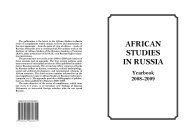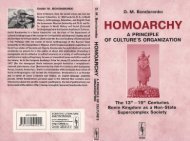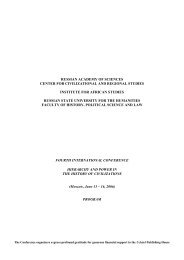L. Fituni, I. Abramova Resource Potential of Africa and Russia's ...
L. Fituni, I. Abramova Resource Potential of Africa and Russia's ...
L. Fituni, I. Abramova Resource Potential of Africa and Russia's ...
Create successful ePaper yourself
Turn your PDF publications into a flip-book with our unique Google optimized e-Paper software.
year to year. Thus, during the first half <strong>of</strong> 2009 the share <strong>of</strong> alimentary<br />
products <strong>and</strong> food increased to 62,3% <strong>of</strong> the total, the major<br />
part being wheat <strong>and</strong> maize.<br />
Russia imports from Egypt predominantly agricultural products<br />
(83% in 2008): citruses, potato, rice, onions, garlic, <strong>and</strong> tea. Russia<br />
also imports manufactured consumer goods (textiles <strong>and</strong> textile<br />
products, footwear – 4,5%, carpets – 3,2%) produce <strong>of</strong> the chemical<br />
industry – 1,7%, including pharmaceutical goods – 0,9%.<br />
The cooperation between the countries in the investment sphere<br />
is not as developed as commodity trade or trade in services. In 2008,<br />
Egypt invested some 16,4 million USD in Russia. The accumulated<br />
amount <strong>of</strong> Egyptian investment in Russia equaled 53,6 million USD,<br />
out <strong>of</strong> which direct investment amounted to 52,7 USD.<br />
The major part <strong>of</strong> Egyptian investment in Russia goes into<br />
manufacturing – 14,8 million USD out <strong>of</strong> the 16,4 million USD total,<br />
in 2008. The volume <strong>of</strong> Russian investment in Egypt is insignificant.<br />
In 2008, only 900,000 USD were invested. However, there<br />
are good perspectives for expansion in the nearest future. One <strong>of</strong> the<br />
areas that particularly interest Russian companies is Egypt’s oil <strong>and</strong><br />
gas sector (see Chapter 2).<br />
Russians underst<strong>and</strong> that Egypt is not among the world's oil <strong>and</strong><br />
gas leaders in terms <strong>of</strong> prospected <strong>and</strong> proven reserves <strong>and</strong> production<br />
<strong>of</strong> hydrocarbons. Nevertheless, revenues from oil <strong>and</strong> gas sales<br />
are <strong>of</strong> primary importance to the country's economy: oil exports<br />
were 65 percent <strong>of</strong> Egypt's total national export volume in 2001-<br />
2002.<br />
Egyptian proved reserves at the end <strong>of</strong> 2002 were 3.7 billion bbl<br />
<strong>of</strong> oil (508.2 million tons) <strong>and</strong> 58,500 bcf <strong>of</strong> natural gas (1,660<br />
m). The country's primary fields are located in the Suez Gulf region<br />
(about 60% <strong>of</strong> total reserves), the Libyan Desert, the Eastern<br />
Desert <strong>and</strong> Sinai. Oil production in 2002 was 37 million tons<br />
Over 20 multinational companies are already working in Egypt,<br />
including Royal Dutch/Shell, British Petroleum, ENI-Agip, ChevronTexaco,<br />
ExxonMobil, TotalFinaElf, British Gas, Norsk Hydro,<br />
Marathon, Apache, Deminex, Dover Petroleum, Dublin Oil, Novus,<br />
Repsol, LUKOIL <strong>and</strong> others.<br />
174







